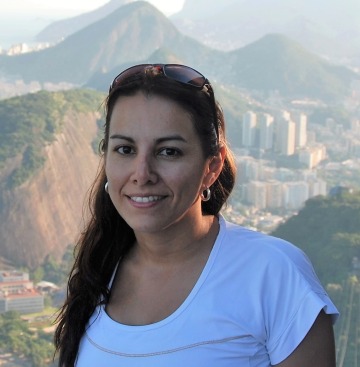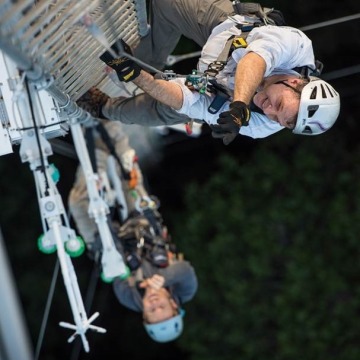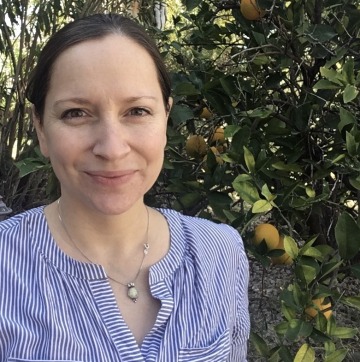Science Café @ the Garden
Tucson Botanical Gardens
2150 N Alvernon Way, Tucson, AZ
UPDATE: In light of continued concerns for public safety and recommendations to minimize the spread of the COVID-19 virus, the College of Science has decided to cancel the remaining Science Café talks scheduled for April & May 2020.
Vital Signs: Diagnosis for the Future of Tropical Rainforests
This series is inspired by the Brazilian, landscape architect and avid conservationist, Robert Burle Marx, currently on exhibit. The quest to understand the complexity and diversity of tropical rainforests rages on, especially in the face of growing global threats. Researchers will present findings from studies ranging in high tech, remote sensing that measures plant diversity, impacts of deforestation in the Amazon and Biosphere 2 Rainforest trends in carbon and water cycling. We'll conclude the series with a local study questioning if rainwater harvesting in landscape design may reduce reliance on groundwater.
Series special offer! Guests of the Science Cafe are invited to stroll the gardens after the talk, courtesy of the Tucson Botanical Gardens

Dr. Sandra Duran
Research Scientist, Department of Ecology & Evolutionary Biology
Mapping Plant Chemistry: Improving Carbon Cycling Models in Tropical Forests
Date/Time:2/6/2020 | 6:00 PM
Venue & Address:Tucson Botanical Gardens, 2150 N Alvernon Way, Tucson, AZ
Talk Description:An international team of scientists led by the University of Arizona used the latest technology in remote sensing to measure plant biodiversity from the Amazon basin to the Andes Mountains in Peru to better understand how tropical forests will respond to climate change.
Speaker Bio:Sandra M Duran is a postdoctoral fellow at the Department of Ecology and Evolutionary Biology at the University of Arizona. She completed PhD in Ecology at the University of Alberta in Canada. She is a broadly trained plant ecologist with extensive field experience in Colombia, Brazil, Costa Rica, Canada and the USA. Her current research focuses on understanding how human-caused disturbances and climate change affect the abundance and distribution of plant communities, and how changes in plant traits influence ecosystem processes and function. To address these questions, she uses use a wide range of techniques and approaches including establishing forest permanent plots, quantifying carbon biomass, measuring plant functional traits and carbon fluxes.

Dr. Scott Saleska
Professor, Department of Ecology & Evolutionary Biology
The New Deforestation Threat: Amazonian Rainforests and the Global Environment
Date/Time:3/5/2020 | 6:00 PM
Venue & Address:Tucson Botanical Gardens, 2150 N Alvernon Way, Tucson, AZ
Talk Description:Tropical deforestation reached a crisis in the Amazon in 2019, and the latest science shows how this will likely have impacts not only in South America but around the world. This is because these vast forests, often called the âlungs of the planetâ, are both sinks for carbon and geysers of water, and are connected through the atmosphere, to the pulse of the planetâs climate and environment.
Speaker Bio:Dr. Saleska is a global change ecologist who studies questions about how ecological communities interact with the atmosphere and climate, from local to global scales, and from the Amazon to the Arctic. These questions are important, because the response of life to climate change is one of the largest uncertainties in predicting the future of climate on earth. He is a Professor of Ecology and Evolutionary Biology at the University of Arizona, where he is Agnese Nelms Haury Faculty Fellow in Environment and Social Justice, and an elected fellow of the Ecological Society of America.
Dr. Joost van Haren
Assistant Research Professor, Biosphere 2, Interdisciplinary Faculty, Honors College
(CANCELLED) The Biosphere 2 Rainforest, a Magnifying Glass for Ecosystem Responses to Environmental Changes
Date/Time:4/2/2020 | 6:00 PM
Venue & Address:Tucson Botanical Gardens, 2150 N Alvernon Way, Tucson, AZ
Talk Description:Biosphere 2 is an iconic facility that allows scientists to experiment with environmental conditions and observe how the land surface or ecosystems respond. A scaled-down, model version of biosphere 1 (the Earth), serves as a magnifying glass on how ecosystems interact with the atmosphere where researchers can compare a mini-closed system to better inform large-scale ecosystem models. I will present the research conducted by Columbia University when it managed Biosphere 2 and preliminary results from the current large-scale international experiment (B2_WALD) tracing carbon and water through vegetation and soil.

Dr. Vanessa Buzzard
Senior Research Specialist, School of Natural Resources & the Environment
(CANCELLED) The Ecology of Water Harvesting
Date/Time:5/7/2020 | 6:00 PM
Venue & Address:Tucson Botanical Gardens, 2150 N Alvernon Way, Tucson, AZ
Talk Description:Water harvest systems are common in residences throughout Tucson, but little has been done to explore how these systems impact ecological processes. We set out to classify changes in ecosystem processes relating to soil health after installation of various water harvesting systems. We assessed variation in soil properties and microbial diversity following installation of three water harvesting treatments; passive, irrigated, and greywater basins. Overall, our observations indicate that water harvesting influences the ecology of soil systems, which may play an important role in conserving groundwater!
Speaker Bio:Dr. Buzzard is a senior research specialist in the School of Natural Resources and the Environment. She received her Ph.D. from the University of Arizona in the Department of Ecology and Evolutionary Biology in 2017, where she focused on plant functional trait distributions across both space and time. She has since moved from studies of predominantly natural systems to focus on urban environments, where she extends questions regarding the drivers of biodiversity and ecosystem function in soils to human environments.
Missed a café? You can find recordings of each café on our Youtube channel!

